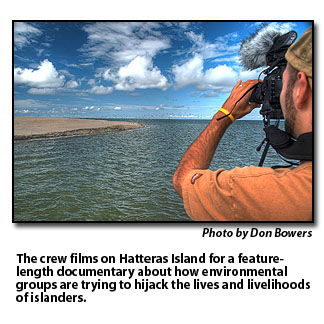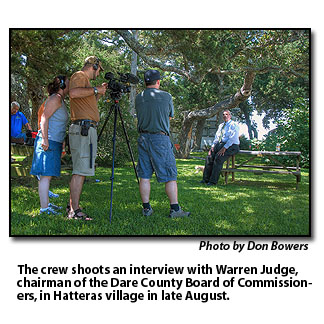Jeff Johnston is the chief executive officer of the Greystone Project, a public affairs and public relations company based in New York.
He is also an avid fisherman. He?s been coming to Hatteras to fish for more than 20 years and likes nothing better than to load his gear in his off-road vehicle and head to Cape Point for four or five or six days of fishing.
He did not like what he saw happening on the island after a court-sanctioned consent decree that ended a lawsuit by environmental groups against the National Park Service and resulted in extensive beach closures for nesting birds and turtles on the Cape Hatteras National Seashore.
Rob Schonk started coming to Hatteras as a youngster with his parents and siblings in about 1958.
He said that for years, his parents, Robert M. Schonk Sr. and his wife Jean, brought the family to Hatteras from Norfolk every other weekend all year. They had a trailer and set up at Cape Point Campground ? winter, summer, spring, and fall ? taking a ferry over Oregon Inlet to get here before the Bonner Bridge was built.
He drifted away from his island visits during college and his early career as a civilian employee of the U.S. Navy as both a civil and environmental engineer.
Eventually, he came back to his island roots, and now at age 58, he has recently retired and is living in Avon.
Schonk also did not like what he saw happening to reasonable beach access on Hatteras Island.
The two men would probably never have met each other, except for a series of serendipitous circumstances and the determination of one couple ? Kim Mosher and Kevin McCabe ? who also did not like what was happening on the island, from the large beach closures under the consent decree to a change in the island lifestyle and culture to the trapping and killing of other animals to protect birds and turtles.
However, through Mosher and McCabe, Johnston and Schonk did meet and were deeply affected by what they learned from the couple.
The result is ?Piping Mad,? a short documentary that has been seen by thousands of people in the last week or two since it was posted online.
It?s on Facebook, and friends are sending the link to thousands of other friends. It?s on You Tube. And it?s also popped up on Web sites for everything from fishing to surfing to boating.
It is, as they say, going ?viral.?
It?s getting the public?s attention, and the 20-minute documentary is about to be followed by a feature-length documentary on the efforts of environmental groups to hijack public access to the Cape Hatteras National Seashore.
The subtitle for ?Piping Mad? is ?Fair People at the Mercy of a Government Gone Fowl.?
It is described by its creators as ?a short documentary covering the emotional and economic woes of the residents of Hatteras Island in the Outer Banks of North Carolina due to beach closures and excessive measures taken by the National Park Service and environmental groups.?
It will be followed later this fall by the feature-length documentary that is currently titled, ?Weathering the Storm.?
Though ?Piping Mad? seemed to burst onto the scene in the debate about beach access, such a project has been talked about for several years as advocates for reasonable beach access tried to get national attention for the plight of Hatteras and Ocracoke islanders whose lifestyles and livelihoods are being threatened by environmental groups.
What finally made it happen in a matter of months is that Mosher and McCabe introduced their friends Schonk and Johnston to each other. And it all happened at just the right time.
Kevin and Kim are transplants to Hatteras Island. He was lured here by surfing and fishing, and she came down for a vacation during her college years. She met Kevin at the Cape Hatteras Lighthouse in 1985, and a year after her 1986 graduation from Virginia Commonwealth University, she moved here.
Both love the island ? its history, its culture, its lifestyle, and the recreational opportunities, such as fishing and surfing.
Mosher is an established and popular artist.
And that is how she met Johnston, who saw her work displayed in a Buxton restaurant. The two started exchanging e-mails. They struck up a friendship based on their passion to keep seashore beaches open and accessible.
Mosher thought Johnston could help with getting national publicity for the plight of the islanders and presented the idea to the Outer Banks Preservation Association about three years ago. However, OBPA, strapped with legal bills, had no money to spend on public relations or documentaries.
Kim Mosher never gave up on the idea ? and then she met Rob Schonk, who did have some money to help the cause.
Schonk and his wife met Kim and Kevin at a dinner party arranged by Carla Reynolds, the Realtor who sold them their retirement home in Avon.
As it happened, Schonk had some money he could use for the cause of his choice.
His father, who was a banker in the Norfolk area died in January, and Schonk and his two brothers and a sister were to make distributions from the Bob and Jean Schonk Charitable Trust. The parents had pre-designated certain sums of money for the Children?s Hospital of the Kings? Daughters in Norfolk and the Cystic Fibrosis Foundation. The rest was to be split among the four siblings and used to benefit organizations of their choice.
Over dinner, a proposal was made to Schonk that perhaps he would like to fund a documentary to spread the word about the situation on the seashore.
?I thought about it for a few minutes, and then I said ?Yes,?? Schonk says.
?What better thing could I do than to give this money to something that meant so much to my parents?? Shonk asks.
So he donated $12,000 to the non-profit OBPA specifically to fund the short documentary.
Everything happened quickly after that, and Johnston came down with a colleague, Kevin Hicks, a managing member of Chinimble Lore, a film development and production company, also in New York. With Johnston as executive producer and Hicks as director and lead writer, the two finished the 20-minute documentary earlier in the summer.
?Piping Mad? was a tool that Johnston planned to use as background information to get editors in the national media interested in following up and bringing a national spotlight to the situation on the seashore.
The short film with its interviews with islanders who talked about how their lives had been changed by the lawsuit by the environmental groups was so compelling that Johnston and Hicks didn?t think they could leave it there.
Johnston called it ?rich, robust, and powerful?
Here is what Hicks said:
?When I was first contacted about this project I never dreamed the depth of the issue here on the Outer Banks. As an outsider looking in you stop and say ?Hey, that can?t be happening here, this is America.? But the inequities and contradictions that are stifling the people here are beyond description. Clearly the people of the Cape Hatteras National Seashore area are caught in the vacuum between manufactured data and a large legal financial machine, both of which are strangling families that go back 300 years here.?
Johnston and Hicks came back to OBPA and Schonk with a proposal for a feature length documentary.
And, again, Rob Schonk stepped up. He invested the additional money necessary to make the feature-length documentary.
His investment was made as another donation to OBPA. He declines to say exactly how much that is, but he says he risked his own funds and will not profit if the film eventually makes money, which Johnston thinks is certainly possible. Schonk will be repaid and any other proceeds will go to OBPA. If the documentary does not bring in any money, Schonk will lose his investment.
Johnston and Hicks returned in late August with a full crew and filmed for five days on the seashore.
Johnston will not say exactly what the documentary has cost, but does says that it would have taken $80,000 to $100,000 to produce at full cost and that ?we are doing this for peanuts.?
He says the full-length documentary will be completed in about 45 days. He has already started marketing it to various media outlets and says that will eventually be shown at film festivals.
?At the end of the day,? he says, ?our goal is to get word of this out.?
He says that he, like a lot of other people, never thought the situation would go so far as it has under the consent decree.
?This film isn?t about off-road vehicle access, which I think many assumed it was when we began,? says Johnston. ?ORV access is only a symptom of a much larger issue and our goal with this project was to examine the entire issue of environmentalism versus human best interest, as well as the gray area in between. Here on the Banks the spectrum is very lopsided. When you consider the money involved in the forced litigation in these cases you begin to obtain a greater sense of what?s driving these issues not only here but around the country.?
Some will consider the documentary one-sided, Johnston adds, and for that, he has no apology.
?We wanted to tell the story from the point of view of the islanders,? he says.
And he adds the islanders filmed for the documentary were not coached and did not get questions in advance.
?They just spoke from their hearts,? he says.
To Johnston and Schonk and Kim Mosher and Kevin McCabe and the many others who supported the work on the documentary, the film is about environmentalism run amok and the cost to islanders and island visitors.
The environmental agenda, Johnston says, is a ?disease? and the symptoms of the disease are the large and excessive beach closures and the ?junk science? that is used to justify them, the delays that environmental groups have caused with the Bonner Bridge replacement, and the damage all of this has caused to the lives and livelihoods of islanders.
?One of our goals is to fully put into perspective the junk science being used by all opposing parties to enforce their actions and mandates. We will take their information and weigh it with experts from around the country in the same fields, and let the court of public opinion formulate their conclusions as to the validity of what’s happened here.?
Schonk adds that as a federal manager for 30 years, much of it in environmental engineering, he ?knows how the game is played.?
?The President doesn?t even have a 1,000-meter buffer around him,? he says.
?People are part of the environment and we have rights too,? Schonk says.
And one final thought from Rob Schonk.
He says this documentary isn?t about him and the money he has donated to make it possible.
Instead he says it is ?the story of the people of Hatteras Island? and a vehicle to honor his parents ?who taught me to love this place.?
Click here to see the short documentary, ?Piping Mad.?



